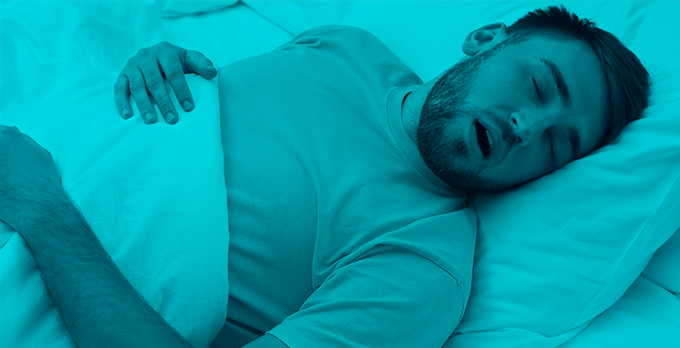If you snore or sleep next to someone who snores, you are probably more familiar with sleep apnea than you may realize. It is a common condition where a person’s breathing continuously stops and restarts while they are sleeping. A lot of people grin and bear the loud and harsh grumbling, but that is not something doctors would recommend, and as of this summer, a new treatment is available at The University of New Mexico Hospital.
Noah Syme, MD, is an assistant professor in the Department of Surgery in the UNM School of Medicine. He is also the first surgeon to perform two Inspire implantations at UNM Hospital.

“I think that is part of the mission of UNM, to serve the whole community, regardless of what their financial status is. I am really happy that now we are able to do that.”
Inspire is an implantable device with three parts. One attaches to a nerve that stiffens the patient’s tongue, another goes in the chest wall to sense when the patient is taking a breath in, and the third is a pacemaker-like generator that integrates the first two parts.
“So, when you breathe in, the device stiffens your tongue to prevent your tongue from collapsing,” Syme said.
What is sleep apnea, and why should you treat it?
Snoring happens when a person’s tongue and throat become so relaxed, the tongue can go limp and block the airway. When someone is snoring, they are not properly breathing or taking in enough oxygen. Some people can stop breathing altogether.
“Sleep apnea is really bad for your general health, specifically your heart and lung health,” Syme said.
Over time, those with sleep apnea can develop heart and lung disease or pulmonary hypertension: high blood pressure within their lung arteries.
“That is dangerous,” Syme said. “It shortens your life span over time.”
Another side effect of sleep apnea is fatigue and lower quality of life.
“We have sort of sleepiness scales.” Syme explained. “You are not getting good sleep, you are getting interrupted sleep because you are waking up all the time, and you are not getting into deeper sleep because your oxygen levels are going low. Then, people just kind of feel lousy and low energy.”
How do you know if this treatment is right for you?
For someone who has not yet been treated and suspects they may have sleep apnea, Syme recommends they talk to their primary care provider about a formal sleep study.
“People who initially are recommended for that test are people who snore, have noisy breathing at night, or their partners witness them stop breathing,” he said. “Then, if they qualify, based on their sleep study, they could get the Inspire.”
Syme said Inspire devices are for people who have sleep apnea and cannot tolerate a continuous positive airway pressure machine (CPAP), which inflates the airway so it does not close while a person is sleeping. But those machines can sometimes deter sleep in other ways. Some find them to be too noisy. Others find the mask to be irritating or uncomfortable.
Since the Inspire device is implanted inside the body, it does not make noise, and the only external piece is a small remote to activate it before bedtime.
To implant an Inspire device, Syme said he makes two small incisions: one under the jawline, and one on the right side of his patient’s chest for the generator. Then, he searches for the hypoglossal nerve, that comes from the brain and connects to the tongue. He wraps a small wire around that nerve and then connects it to the generator under the skin. A second wire connects from the chest wall to the lungs.
“We test it while the patients are asleep,” Syme said. “We make sure the tongue is stiffening the way we want it to, then we close up shop, and then it is a day surgery. So, people go home the same day.”
Improving Sleep Medicine at UNM Hospital
Inspire received FDA approval in 2014. The first procedure in New Mexico was performed privately just over two years ago.
Syme said bringing the procedure to UNM Hospital has been a project several years in the making, and he is excited to watch the program ramp up after his first two successful procedures in June.
What makes the surgeries at UNM Hospital unique is this is the first time in the state this surgery is accessible to patients who are not privately insured.
“I think that is part of the mission of UNM, to serve the whole community, regardless of what their financial status is. I am really happy that now we are able to do that,” Syme said.
Syme said his team is already evaluating new candidates for the Inspire procedure. He predicts they will perform an average of 10 surgeries a month.
“Sleep is so important. Everybody sleeps, it is a vital part of our life, and I am just really excited to get the program going,” he said.
If you or someone you know needs to help getting extra rest at night, you can read more about Sleep Medicine at UNM Health here
